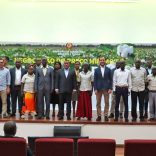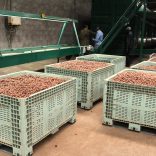Agreement signed for Mozambique to host SADC Fisheries Monitoring Centre in KaTembe
Mozambique: Nyusi launches 2019/2020 agricultural year in Metuchira, Nhamatanda – AIM

Photo: Notícias
Mozambican President Filipe Nyusi declared on Monday that the main goal of the 2019/2020 agricultural campaign is to consolidate all the stages and targets defined in the previous years of his first period of governance (2015-2019), looking forward to diversified, sustainable and competitive agriculture.
Speaking at the ceremony launching the campaign in Metuchira, in the central province of Sofala, Nyusi said the task of the present season is to consolidate previous gains in the drive for a diversified agriculture.
Thousands of people attended the ceremony, including farmers, traders, and providers of agricultural services. Prizes were awarded to people who had made an outstanding contribution to agriculture this year.
Summarising the 2018/2019 agricultural year, Nyusi said there had been a decline in grain production because of the combined impact of drought in the southern provinces, and two devastating cyclones, Idai and Kenneth, in central and northern Mozambique.
As a result, grain production fell from 3.2 million tonnes in the 2017/2018 agricultural year to 2.6 million tonnes, a fall of almost 19 per cent.
As an improvement in organisation, Nyusi mentioned the reintroduction of the agricultural marketing card, intended to draw up a register of economic agents involved in marketing, and provide a statistical record of marketing data.
He also announced the creation of a rotating marketing fund with the value of 500 million meticais (about eight million US dollars).
The President said that several products had been gaining ground in export markets. Thus from January to September this year, Mozambique had exported 168,000 tonnes of sugar, to the value of 53 million dollars. The main markets were Europe, the United States, and central Africa (Uganda, Rwanda and Burundi).
“All this is thanks to our economic diplomacy”, said Nyusi. “We also exported a variety of fruit to Europe and Japan. We also have crops such as sesame, soya and macadamia nuts which are being tested in China. What seems a dream is now being implemented”.
Nyusi recalled that, two years earlier, when he had launched the 2017/2018 agricultural campaign, he had said that agriculture contributes to reducing the cost of living, by making food available on the market, thus lowering inflation and stabilising the economy.
“That’s exactly what happened”, he said. “Our economy grew and inflation fell significantly. To a great extent, this is because of the positive performance of the agricultural sector”.












Leave a Reply
Be the First to Comment!
You must be logged in to post a comment.
You must be logged in to post a comment.